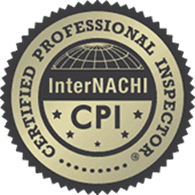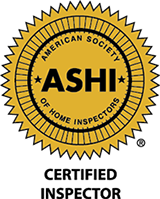Common Defects found in Boise area Homes
Buyers sometimes make comments, such as "You've probably seen it all when it comes to home and building defects." From a buyer's or seller's perspective, a home inspector's knowledge and experience might sometimes appear to be that complete. But in truth, no inspector has encountered every possible situation. And just when an inspector is developing that false level of self-assuredness, something new and surprising emerges in the types of defects found at Boise area inspections.
I've discovered that no one ever sees or knows it all. There's always some new surprise when you least expect it. However, I've also found that there are common types of property defects which rear their heads often, not just in older homes, but often in brand new ones, even before the smell of the new paint has become a memory. So here is our most common list of defects likely to appear in a home.
Improper Surface Grading and Drainage:
By far the most frequent problem, it is responsible for the most common household aggravations, including water penetration into the basement or crawlspace. Most basements will eventually leak. Correction can be as simple as re-grading the exterior grounds, adding roof gutters or sub-surface drains. Unfortunately, major drainage improvements are sometimes the only practical solution, requiring costly ground water systems such as French drains designed by experts such as geotechnical engineers.
Roofing Defects:
Problems with roofing material, either due to aging and wear or to improper installation are likely to be found in the majority of homes. This does not mean that most roofs are in need of replacement, but rather that most are in need of some type of maintenance or repair.
Ceiling Stains, Indicating Past or Current Roof Leaks:
The problem here is that you often can't tell if the roof still leaks, unless it is inspected on a rainy day. Some stains are merely the residual effects of leaks that have been repaired. There is also the possibility that ceiling stains were caused by a former plumbing leak in the attic, bathrooms, etc...
Water Intrusion:
Water intrusion into basements or crawlspaces due to ground water conditions: Such problems can be pervasive, difficult to resolve, and sometimes very damaging to buildings. Correction can be as simple as re-grading the exterior grounds or adding roof gutters with splash blocks and extensions to direct water away from the structure. Unfortunately, major drainage improvements are often the only practical solutions, requiring costly ground water systems such as French drains designed by experts such as geotechnical engineers.
Electrical Safety Hazards:
Electrical safety hazards, especially (but not always) in older homes: Examples are ungrounded outlets, lack of ground fault interrupters (shock protection devices), faulty wiring conditions in electrical panels or elsewhere in a building, etc. Such problems may be the result of errors at the time of construction, but more often they are due to wiring that was added or altered by persons other than qualified electricians.
Rotten Wood:
Rotted wood at building exteriors and at various plumbing fixtures: In places where wood stays wet for long periods, such as roof eaves, exterior trim, of decks, around tubs and showers, or below loose toilets, fungus infection is very likely to attack, resulting in a condition commonly known as dry rot. If left unchecked, damage can become quite extensive.
Building Violations Where Additions and Alterations Were Constructed Without Permits:
Homeowners will often tell a home inspector, "We added the garage without a permit, but it was all done to code." This statement is a red flag to most home inspectors, because no one could possibly know the entire building code, and the average person without professional involvement with the code is likely to know very little of it. Whenever an owner offers code assurance, I know that problems are likely to be found. We will make note of obvious renovation or additions requiring permits in our inspection report.
Unsafe Fireplace and Chimney Conditions:
These can range from lack of maintenance, such as neglecting to hire a chimney sweep, to faulty installation of fixtures. Most common among these are the lack of spark arrestors and substandard placement of wood-burning stoves. Free-standing fireplaces are typically installed by home owners and handymen, people without an adequate knowledge of fire safety requirements. The most common violations in these cases involve insufficient clearance between hot metal surfaces and combustible materials within the building. Fire hazards of this kind are often concealed in attics, where they remain undiscovered until a roof fire occurs.
Faulty Installation of Water Heaters:
In most localities, less than 5% of all water heaters are installed in full compliance with plumbing code requirements. Violations can include improperly installed overflow piping, unsafe flue conditions, or faulty gas piping. It should also be remembered that today's water heaters are designed to have shorter longevity than in the past. In fact, leaks can develop in units that are only five years old.
Hazardous Conditions Involving Gas and Oil Heaters:
Most gas and oil fueled heaters are in need of some maintenance, if only the changing of an air filter or a long-overdue review by an expert. In some cases, however, gas and oil heaters contain life-threatening defects that can remain undiscovered until too late. These can range from fire safety violations to the venting of carbon monoxide into the building. A cracked heat exchanger, for example, can remain undiscovered unless found by an expert or until tragic consequences occur.
Firewall Violations In Garages and Attics of Condominium/Townhouses:
Special fire-resistive construction is required for walls and doors that separate a garage from a dwelling and separate multi dwellings. Violations are common, either due to faulty construction, damage or alterations to the garage or attic interior, or changes in code requirements since the home was built. In older homes, where firewalls are not installed, sellers and agents will often say that the building predates the code. However, these conditions should be corrected for safety reasons.
Inadequate Ventilation Of The Attic Space:
Effective attic ventilation will keep your home more
comfortable throughout the year, prevent premature damage to roof framing and
sheathing, and will help improve indoor air quality. During the hot Boise summer
months, temperatures in your attic can reach in excess of 160 degrees (so far
the hottest attic I have been in is 164 degrees). As heat builds up in the
attic, it radiates to the attic floor, then into adjacent living areas. This
makes rooms beneath the attic uncomfortably hot and more difficult to cool. That
means air conditioning and appliances will run longer and waste energy.
During the heating season, heated indoor air and moisture travels from the home
into the attic. The average home produces a significant amount of moisture from
bathing, cooking and cleaning -- as much as 22 pints of moisture per day. When
moist air hits cooler rafters and roof sheathing, it condenses and drips,
wetting insulation and contributing to the growth of mold and mildew. This in
turn can affect items stored in the attic, lead to wood rot and mold growth.
During the heating season, ice dams are often caused by poor attic ventilation.
Without adequate air exchange, warm air accumulates at the peak of an attic
while the eaves remain cold. After a heavy snowfall, escaping attic heat melts
snow at the ridge of the roof, and the water runs down the roof. At the eaves,
the water freezes, forming a dam of ice. Some of the trapped water can seep
through the roof, damaging shingles, the roof deck, even your home's interior.
Adequate attic ventilation and insulation prevents ice dams. That's because heat
can be vented out of the attic, resulting in a cold roof deck where snow melts
evenly.

 NACHI CPI
#18092023
NACHI CPI
#18092023
 #244451
#244451

